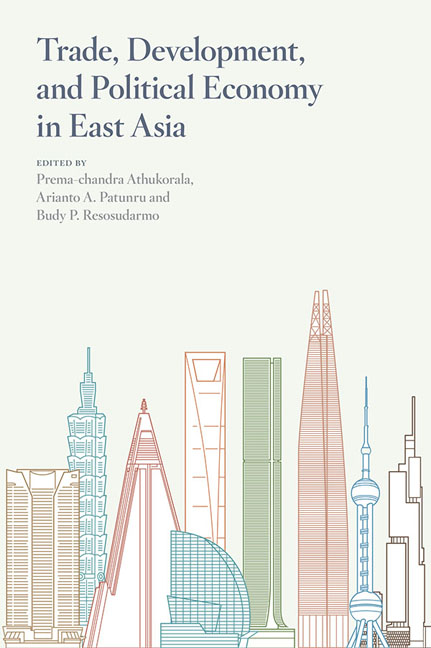Book contents
- Frontmatter
- Contents
- Tables
- Figures
- Contributors
- Foreword
- Acknowledgments
- Glossary
- 1 Introduction
- PART 1 TRADE
- PART 2 DEVELOPMENT
- 5 Economic relations between China, India and Southeast Asia: coping with threats and opportunities
- 6 Revisiting the growth acceleration episodes of Indonesia and India: a political economy reading
- 7 Exporting, education, and wage differentials between foreign multinationals and local plants in Indonesian and Malaysian manufacturing
- 8 Indonesia: returns to occupation, education, and ability during a resource export boom
- 9 Labour market regulation and employment during the Yudhoyono years in Indonesia
- 10 Vietnam: trapped on the trail of the tigers?
- PART 3 POLITICAL ECONOMY
- References
- Index
9 - Labour market regulation and employment during the Yudhoyono years in Indonesia
from PART 2 - DEVELOPMENT
Published online by Cambridge University Press: 19 May 2017
- Frontmatter
- Contents
- Tables
- Figures
- Contributors
- Foreword
- Acknowledgments
- Glossary
- 1 Introduction
- PART 1 TRADE
- PART 2 DEVELOPMENT
- 5 Economic relations between China, India and Southeast Asia: coping with threats and opportunities
- 6 Revisiting the growth acceleration episodes of Indonesia and India: a political economy reading
- 7 Exporting, education, and wage differentials between foreign multinationals and local plants in Indonesian and Malaysian manufacturing
- 8 Indonesia: returns to occupation, education, and ability during a resource export boom
- 9 Labour market regulation and employment during the Yudhoyono years in Indonesia
- 10 Vietnam: trapped on the trail of the tigers?
- PART 3 POLITICAL ECONOMY
- References
- Index
Summary
Professor Hal Hill has been a tower of strength and inspiration for economic research on the Indonesian economy over almost three decades, both for international as well as Indonesian scholars. This author's academic career spanned much the same time period as Professor Hill's, both as a PhD scholar and a decade later as a researcher for 20 years at the Australian National University (ANU). Our interests have been similar—understanding the diversity and resilience of the Indonesian economy, often against all odds, internationally, and often in spite of the interventions by politicians in Jakarta. The author personally owes a great debt of gratitude for Hal Hill's support and a wonderful friendship, for much of this period, especially during his 20 years as a researcher at the ANU in 1991–2011. Terima kasih Pak.
During his career, Professor Hill developed a healthy scepticism of regulated markets in the Indonesian context. Partly, this scepticism reflects changes in the approaches to development policies among main-stream economists since the 1960s and 1970s when he began his career. It also manifests a judgment that successive Indonesian governments have been unable to keep their promise of improving efficiency and erasing inequities through market interventions, partly because of weak legal institutions and poor governance. In this chapter, I take up this theme by focusing on some of the effects of regulations of Indonesia's labour market in recent times.
One of Indonesia's main development problems is that a high proportion of the workforce—around two-thirds—are employed in low-productivity agriculture and in the informal sector. Mainly, this is related to Indonesia's stage in economic development as a lower middle-income country. The meagre stock of both physical capital per worker and human capital reflects Indonesia's stage of development. Not enough workers have moved into higher productivity jobs especially in manufacturing, and that transfer slowed after the Asian financial crisis of the late 1990s, despite reasonable and improving rates of economic growth in the 2000s (World Bank 2010b).
It has been suggested that both low productivity and high wages in some segments of the economy have contributed to high and rising unit labour costs relative to productivity, compared with neighbouring countries (Nellor 2013). That process has also contributed the poor employment record. Part of the problem relates to the dualistic structure of output in manufacturing, which is related to technology and market orientation.
- Type
- Chapter
- Information
- Trade, Development, and Political Economy in East AsiaEssays in Honour of Hal Hill, pp. 153 - 172Publisher: ISEAS–Yusof Ishak InstitutePrint publication year: 2014

